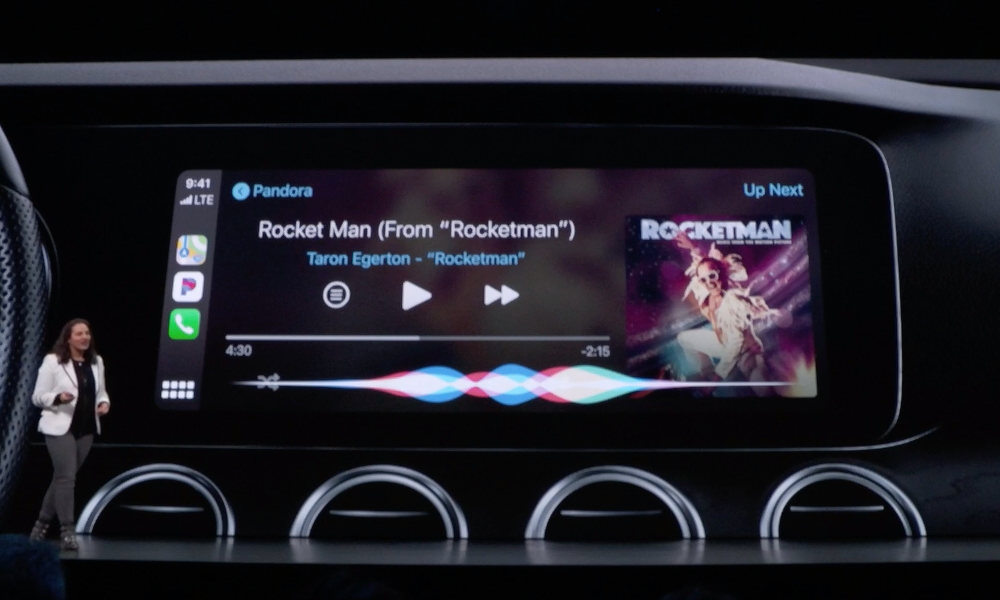Apple Is Opening up Siri to Spotify and Other Music Apps
 Credit: Apple
Credit: Apple
Toggle Dark Mode
Apple has a long habit of taking a very slow and measured approach when it comes to opening up its technologies to third-party app developers, and it’s a strategy that often frustrates both developers and end users, who find themselves limited in their ability to do the kind of things with third-party apps that Apple can do with its own.
This has been especially apparent with Apple’s voice assistant, Siri. While Siri debuted in 2011, it took five years before Apple even began to provide features that would allow the voice assistant to interact with third-party apps, and it’s initial attempt, in the form of SiriKit in iOS 10, limited Siri’s interactions to only six categories of apps — VoIP calling, messaging, payments, workouts, ride booking, and photo searching.
Conspicuously absent from this list were those apps that could be seen as direct rivals to Apple’s own services like Apple Music, and even when the company expanded SiriKit in subsequent iOS versions, it only added categories like task management apps, leaving out more popular and in-demand options like Spotify and Google Maps.
While this arguably wasn’t a huge problem on the iPhone and iPad — after all, while it’s nice to be able to call up music and directions by voice, it’s hardly a critical feature for most people — when it came to devices like the Apple Watch, CarPlay, and HomePod, it basically left users stuck with a subpar experience unless they were willing to use Apple’s own apps.
For example, Spotify was long available on CarPlay, but you couldn’t simply call up a song by voice — you had to poke around on your dashboard. Playing anything other than Apple Music though a HomePod also required that you start up your playlist on an iPhone or iPad and then stream it using AirPlay — something you could do just as easily with a lot of other speakers as well.
The contrast between the seamless Apple Music experience and what users of rival services like Spotify were able to do was stark enough that it became a key point in Spotify’s recent antitrust complaint against Apple, with the streaming service noting that Apple is “locking Spotify and other competitors out of Apple services such as Siri, HomePod, and Apple Watch.” While Apple disagreed with many of Spotify’s claims, there was really no disputing that Apple has in fact left Spotify and others out of the HomePod experience (although with the smart speaker’s minuscule market share and dozens of alternatives available, we’re pretty sure that this move hurts Apple more than it does Spotify).
For whatever reason, however, it looks like this is about to change in iOS 13, with Apple finally taking the next step in expanding SiriKit to embrace third-party music, podcasts, audiobooks, and radio apps. Apple actually touched on this during its WWDC keynote while describing new CarPlay features in iOS 13, saying that it would now be possible to use Siri in the car with third-party apps “like Pandora and Waze.”
What’s still unclear is exactly how far Apple’s new SiriKit support will go. CarPlay works as an extension of the iPhone — basically just a second screen — so Siri requests made to CarPlay are really being made to iOS. Whether this will be extended to the HomePod at all is more of a mystery, and based on the way that SiriKit works right now, we’re expecting that even if it does arrive on the HomePod, it’s likely to rely on the user’s iPhone being nearby and on the same Wi-Fi network, in the same way that all other SiriKit and personal requests currently work with the smart speaker.
Of course, like other SiriKit features, it’s also going to be up to individual developers to enable this functionality, but we suspect that with the competitive edge that this will offer them against the Apple Music incumbent, most of the big ones are going to be pretty quick to do so.






